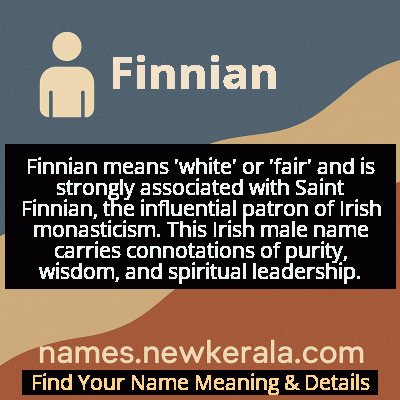Finnian Name Meaning & Details
Origin, Popularity, Numerology Analysis & Name Meaning of Finnian
Discover the origin, meaning, and cultural significance of the name FINNIAN. Delve into its historical roots and explore the lasting impact it has had on communities and traditions.
Name
Finnian
Gender
Male
Origin
Irish
Lucky Number
4
Meaning of the Name - Finnian
Finnian means 'white' or 'fair' and is strongly associated with Saint Finnian, the influential patron of Irish monasticism. This Irish male name carries connotations of purity, wisdom, and spiritual leadership.
Finnian - Complete Numerology Analysis
Your Numerology Number
Based on Pythagorean Numerology System
Ruling Planet
Uranus (Rahu)
Positive Nature
Strong sense of order, loyal, practical, and disciplined.
Negative Traits
Stubborn, overly serious, rigid, and prone to feeling restricted.
Lucky Colours
Blue, gray.
Lucky Days
Saturday.
Lucky Stones
Blue sapphire.
Harmony Numbers
1, 7, 8.
Best Suited Professions
Managers, engineers, accountants, organizers.
What People Like About You
Dependability, discipline, practicality.
Famous People Named Finnian
Saint Finnian of Clonard
Monastic founder and saint
Founded Clonard Abbey and educated the Twelve Apostles of Ireland
Saint Finnian of Movilla
Bishop and scholar
Founded Movilla Abbey and introduced biblical scholarship to Ireland
Finnian O'Toole
Irish chieftain
Lord of Imaile and prominent figure in Irish resistance
Finnian O'Driscoll
Gaelic poet
Preserved Irish poetic traditions during the Penal Laws era
Name Variations & International Equivalents
Click on blue names to explore their detailed meanings. Gray names with will be available soon.
Cultural & Historical Significance
The name represents Ireland's golden age of saints and scholars, embodying the fusion of native Celtic culture with Christian learning that characterized early medieval Ireland. Throughout Irish history, the name has maintained its religious and cultural resonance, often chosen by families seeking to honor Ireland's spiritual heritage and monastic traditions. The legacy of Saint Finnian continues to influence Irish Catholic identity and serves as a reminder of Ireland's significant contribution to European civilization during the early Middle Ages.
Extended Personality Analysis
Individuals named Finnian are often perceived as possessing a blend of intellectual curiosity and spiritual depth, reflecting the name's monastic associations. They tend to be thoughtful, principled individuals with strong moral compasses and a natural inclination toward learning and teaching. Many Finnians exhibit quiet leadership qualities, preferring to lead through wisdom and example rather than authority, much like the saintly figures who bore this name historically.
Their personality often combines Celtic creativity with disciplined thinking, making them both imaginative and practical. They typically value tradition and heritage while remaining open to new ideas, creating a balanced character that respects the past while engaging with the present. In social settings, Finnians are often described as reliable friends with good listening skills and thoughtful advice, though they may sometimes appear reserved until comfortable in their surroundings. This combination of depth, reliability, and intellectual engagement makes Finnians valued members of their communities and families.
Modern Usage & Popularity
In contemporary times, Finnian has experienced a revival as part of the broader trend toward traditional Irish names. While not among the most popular names, it maintains steady usage particularly among families with Irish heritage or those seeking names with historical and spiritual significance. The name appeals to parents looking for something distinctive yet classic, with strong cultural roots. In Ireland, it remains more common in rural areas and among families with strong connections to Irish history and Catholicism. Internationally, Finnian has gained some popularity in English-speaking countries as part of the Celtic name revival, often chosen by parents who appreciate its saintly associations and melodic sound. Its usage has been gradually increasing since the 1990s, reflecting growing interest in heritage names with meaningful backgrounds that connect children to cultural and spiritual traditions.
Symbolic & Spiritual Meanings
Finnian symbolizes wisdom, spiritual guidance, and cultural preservation. The name carries connotations of light and purity from its 'white' or 'fair' meaning, representing enlightenment and moral clarity. As the name of important monastic founders, it embodies the transmission of knowledge across generations and the preservation of learning during turbulent times. Symbolically, Finnian represents the bridge between ancient Celtic traditions and Christian spirituality, embodying the synthesis of native wisdom with new religious insights. The name also carries associations with teaching and mentorship, reflecting the educational legacy of Saint Finnian's monastic schools. In a broader sense, it symbolizes Ireland's cultural resilience and the enduring power of spiritual and intellectual traditions to shape identity and community across centuries, serving as a reminder that knowledge and faith can illuminate even the darkest periods of history.

